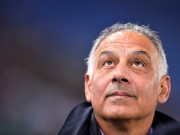While European teams have long looked to the Far East to engage with fans and sell merchandise to local supporters, some of the continent’s elite clubs including Barcelona and Manchester City are increasingly using China as a potentially lucrative market to boost revenues through more inventive and long-term solutions.
The instigator of this trend is the Chinese president Xi Jinping, who is aiming to turn China into a global football power capable of competing both continentally – and numerous Chinese clubs have recently been investing heavily on players – and internationally. The culmination of the sporting revolution is hoped to be success on the biggest stage of all: the World Cup. It is an ambitious plan, but perhaps things are already coming together, after China received a boost with the news that FIFA would allow them to host the centenary World Cup in 2030.
Xi’s enthusiasm for developing the game in China has been noted in Europe, and clubs are already looking to ride this wave of Chinese momentum. “One of [Xi’s] big projects is to expand football in China,” Barcelona president Josep Maria Bartomeu told the Financial Times as he opened a €4m football complex, including a football school and a Barcelona shop, on the island of Hainan. “This is our little help to this big project. Asia is probably the most important and most fast-growing area of the world.”
This is part of a growing trend from clubs who are eager to position themselves more permanently in China; the likes of Manchester City, Manchester United and Real Madrid have played in China in the International Champions Cup in the last couple of years, and both teams have since opened commercial offices in China. Bayern Munich and Wolfsburg have since joined them in the last few months, opening offices in Shanghai and Beijing respectively.
According to Tom Elsden of Mailman Group, a sports marketing consultancy in Shanghai, “clubs have realised that they need to be out here in China, not just on social media and e-commerce platforms. We’re in the middle of the football revolution, so expect the top European clubs to be more aggressive than ever.”
Wolfsburg have already revealed that 16% of the club’s sponsorship revenues are generated from outside Germany, largely from China, and managing director Thomas Röttgermann is hoping that their new Beijing office will help them to build on these revenues.
“There’s a lot of money in the market and a lot of plans, but not so many things are realised,” he explained, adding that, while Wolfsburg may not be as famous as the likes of Barcelona or Manchester United, they and similar sized clubs have “a real chance to be interesting for the people”. Social media figures back this up: Wolfsburg already have twice as many followers on their Chinese language Weibo account as they do on the club’s official German language Twitter account.

European clubs’ aims, therefore, are as long-term as Xi Jinping’s. Transient summer tours for high-profile friendlies are all well and good, but having a more permanent presence in China is helping clubs to agree ever more lucrative sponsorship deals, commercial partnerships, and increase the number of fans in the country, who help to drive merchandise sales and interact with the clubs across their various social media platforms.
While results on the pitch are what ultimately matter to supporters, clubs’ use of social media is vital in helping to increase their number of fans. Not only should they be using local social media platforms, such as Weibo (313 million active users as of March 2017), but in using them they should be inventive and China-specific. Various clubs including Tottenham Hotspur and Napoli have actively reached out to their target audience by using Chinese hosts to present behind-the-scenes live streamed content, while Manchester City have found a more innovative solution by supporting a football-based reality TV show in Guangdong.
City are also one of the teams to have recently benefited directly from Chinese investment, after Li Ruigang bought a 13% stake in the club’s parent company City Football Group in 2015 for $400 million. Chinese businesses and businessmen have bought stakes in numerous other European clubs, from Milan and Inter in Italy to Atletico Madrid and Espanyol in Spain, from Lyon and Sochaux in France to Aston Villa and Wolverhampton Wanderers in England.
Given that clubs are desperate for additional sponsorship income and other revenue streams in order to grow financially, and given that Chinese businesses are equally ready to provide this investment as China attempts to increase its standing in the modern game, there is a mutually beneficial arrangement in clubs looking to target China. Tom Glick, the chief commercial officer of Manchester City’s controlling company, regularly spends time in China in search of new sponsorship deals, keeping in mind both Chinese companies who are looking to increase their appeal abroad and international companies who want to develop their brand in China.
City Football Group are well-known for developing a network of clubs: following the initial takeover of Manchester City, the holding company also own New York City, Melbourne City and Club Atlético Torque, as well as a 20% stake in Yokohama Marinos. Could a Chinese Super League club follow suit to join the City Football Group network? “There is nothing imminent,” says Tom Glick, “but in the medium or long-term, this is something that is very interesting to us.”






































